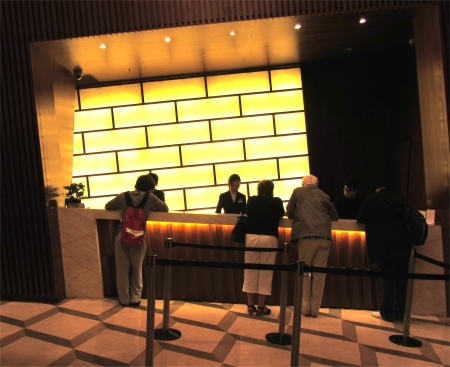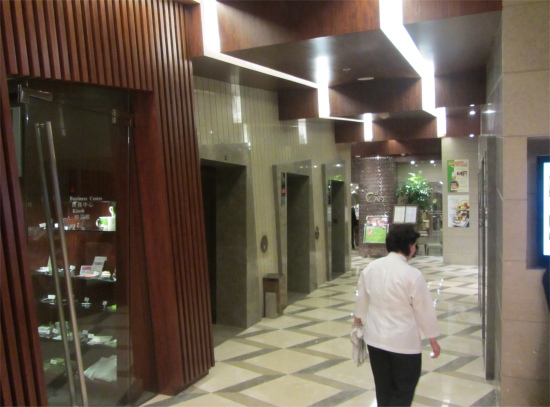Having soaked up as much of the atmosphere as I could, I idly strolled around the harbour, across Pyrmont Bridge, and climbed back up to George Street, which would take me back to my hotel.
The streets were heaving with people, Asians dominating the never ending surges between pedestrian crossings. For those not carrying backpacks, I could never tell who were locals or tourists. The one exception to this; the pale whites were obviously from the northern hemisphere.
The journey to the airport was uneventful. The Chinese driver of the shuttle bus had a fixed smile on his face all the time, even when he was being cut up by other drivers. How do people manage to keep that smile?
The chap sitting next to me on the flight hailed from Sydney. He worked in the banking sector and at one point in his career had spent 7 years working in London. He was on his way back via Hong Kong to London, for a reunion with his previous work colleagues, and also to visit friends he had made there. "On my way back I will return through Hong Kong, and stop off to meet up with friends. We will watch the Hong Kong Rugby Sevens together," he told me. I was envious, I would miss the rugby sevens by a day.
We chatted about banking in Australia, where they didn't get themselves into the mess that the western world seems to have done. "..... unemployment is around 5%, house prices are high, the construction industry is lagging behind demand .....," he told me. "What's your biggest problem - immigration?" I asked. "No, not immigration," he told me, "we could do with a lot more people in the engineering sector. We have rich mineral resources, and business is booming in the mining industry. The danger is of course if our markets in India and China suddenly fluctuate. Our biggest problem is individual debt management. Too many individuals are currently loaded up to their necks in debt, and the problem is escalating. We don't see any easy way out of the situation."
As we coasted the skies above the South China Sea, my mind turned towards the history of Hong Kong, the gateway to China, and renowned as the "Pearl of the Orient".
Human settlement in Hong Kong existed more than 6,000 years ago at many sites along its winding shoreline. The region was first incorporated into Imperial China in the Qin Dynasty in 221B.C., and served as a trading post and a naval base during the Tang Dynasty and the Song Dynasty. Western influence in China came about at the beginning of the 15th and 16th centuries due to the increased trade in Chinese products, such as silk and tea through the Silk Road that stretched from north-western China to Eastern Europe. The Europeans were interested in Hong Kong's safe harbour located on the trade routes of the Far East, thus establishing a trade enterprise between Western businessmen and China. The area's earliest recorded European visitor was Jorge Alvares, a Portuguese mariner who arrived in 1513. Contact with the United Kingdom was established after the British East India Company founded a trading post in Canton, Guangdong Province, and the British dominated foreign trade in the southern region during the early stages of Western connection with China.

Hotel Foyer with Its Eight Degrees
|
During the 19th-century, Britain was keen to ship silk and tea back to the homeland, particularly the latter since it had become the national drink. Tea was only grown in China, and the home market required huge quantities. The Chinese were not interested in importing goods from Britain, trade was restricted to silver bullion only. Indeed the Chinese limited maritime access to their Kingdom only at a small trading depot in Canton.
The British seized upon a less than honourable approach, and started to import opium into China, the drug being exported from India by the British East India Company. Soon many Chinese, ranging from peasants to nobility, were addicted to the powerful drug, and now China was paying in silver bullion to support the habit.
The sale of opium saw a huge success by the beginning of the 19th Century. Fearful of the outflow of silver, the Chinese emperor banned the drug trade in 1799 but to no avail. Smuggling came about as neither foreign traders nor Guangdong merchants were inclined to forego the profitable business. Throughout the next few years, the British enjoyed a fruition of success from opium. In 1839, Lin Zexu was appointed by the emperor as a special commissioner to Guangzhou to stop the drug trade. He and his troops used force to impel the foreign factories to surrender their stocks of opium, which were then destroyed. This act was the stepping stone to the First Opium War when the Chinese and the British could not comply with one another's demands. On January 26, 1841, the British flag was raised at Possession Point on Hong Kong Island, and British occupation began. A few months later, officials were selling plots of land and the colonization of Hong Kong began. The Chinese war junks were no match for the Royal Navy, and the war ended in 1842 with the defeat of China. The notorious Qing Government nervous at the thought of more devastating attacks decided to sign the first unfair "Treaty of Nanking", and allowed to cede the Hong Kong island in perpetuity to Britain, open five other ports for foreign trade, and allowed the continued importation of opium into the country, as well as paying an exorbitant cash indemnity for the loss of the destroyed opium. The Treaty of Nanking greatly encouraged the British to demand more rights and territory from China. In 1856, Chinese officials searching for pirates arrested the crew of a British ship. This act ignited the second Opium War, which lasted to 1858. The British were after more trading ports and the legalisation of the opium trade, and took possession of the Kowloon Peninsula and Stonecutters Island in 1860. Needing more land for defence, a 99-year lease on the New Territories, comprising the area north of Kowloon up to the Shenzhen River plus 235 outlying islands, was granted in 1898.
Over the following century, Hong Kong's unique blend of Chinese life and British traditions developed and the economy flourished under an appointed governing body. As the lease of the New Territories approached its expiry date, the governments of the United Kingdom and the People's Republic of China began to discuss the issue of Hong Kong's sovereignty in the 1980s. In 1984, the two countries signed the Sino-British Joint Declaration, agreeing to transfer the sovereignty of Hong Kong to China in 1997. The declaration stipulated that Hong Kong would be governed as a special administrative region which based upon a "One Country, Two Systems" principle, an arrangement allowing Hong Kong to enjoy a high degree of autonomy, retaining its capitalist system, independent judiciary and rule of law, free trade and freedom of speech for at least fifty years after the reunification.
The Basic Law of Hong Kong, which would serve as the constitutional document after 1997, was ratified in April 1990. In autumn 1992, Chris Patten, the last Governor of Hong Kong, introduced drastic democratic reforms to the election process for the Legislative Council of Hong Kong, which was strongly opposed by Beijing. Despite the heated debate between Beijing and London and the dissonance in the society, the solemn ceremony of Hong Kong's sovereignty transfer held smoothly and successfully in the Hong Kong Convention and Exhibition Centre at midnight on July 1, 1997. Tung Chee Hwa assumed office as the first Chief Executive of Hong Kong Special Administrative Region.
Since then, Hong Kongers have got used to the laissez faire attitude of the Hong Kong Government in juxtaposition to China. As one of the freest economies in the world, nearly 7 million people are crammed into and make a living from the mere 1,100 square km that make up the Hong Kong Special Administrative Region(SAR). Hong Kong is second to Tokyo in terms of population density. The pace of life is quick and Hong Kong is renowned for its efficiency and rush hour traffic. The official language in Hong Kong is Cantonese rather than Mandarin but English is commonly spoken. In Cantonese, "Hong Kong" mirrors the Cantonese pronunciation "Heung Gong", meaning "fragrant harbour". The name stems from the fact that Hong Kong's harbour used to be a humid sleepy fishing village with plenty of boats parked around the harbour.
Soon I was gliding down to Lantau Island, the base for Hong Kong's airport.

More Crazy Angles
|
Whilst standing in the airport immigration queue, which stretched endlessly around a maze of barriers, I heard a shout, "Dad!" It was Dan, my son, who landed shortly after me. As we passed each other along the barriers, we gave each other a hug. It was good to see him after 4 months.
Once through to the "other side", we caught a cab to our hotel, which was quite a distance from public transport links. He excitably told me about Japan as we were transported past invisible water fronts hidden in the dark behind banks of heavy mist. Mountains of lit up high rise flats stood all around, and they really were high.
Soon we departed the main highway and started travelling through the working class residential area of Ma Tau Kok. Here, in the gloomy neon lights, high rise blocks could be made out, which at first seemed derelict, but closer inspection revealed them to be covered in air-conditioning units and warehouses worth of washing hanging out on lines miraculously attached to the buildings. The odd thing about these residential areas was the lack of light shining from windows. Were they all at work, or could they not afford electricity?
We arrived at our hotel, the Harbour Plaza 8 Degrees. Our cab driver, who had a very limited command of the English language, had joked with us when we jumped into his cab, or I think it was a joke. I gathered that there are many Harbour Plaza hotels in Kowloon, and the words appended are the distinguishing features. Once inside the hotel, we saw immediately why it had the words 8 Degrees in its title. Everything seemed to be on the tilt; a tilt of 8 degrees in fact. The floor resembled an Escher design, which combined with the lack of rectangles, gave the impression it was sloping. This was a mighty illusion, and induced in Dan and I a feeling of giddiness. With no horizon to focus on, a mild state of sea-sickness took hold. We discovered later the 8 degrees theme was repeated elsewhere in the hotel, for instance the plates in the restaurant were parallelograms, and the glasses had 8 degree tilts.
We dumped our bags, and took a walk around the block in a clinging mist, and found a small restaurant where we took refuge. After our flights, we were peckish, but not hungry, so we ordered a dish between us. We could have gone for the goose intestines, pig intestines, goose webbed feet and wings, or a few other savouries (I am not joking about those delicacies), but we opted for a humble "beef" satay plus a beer each. There we were with a scattering of Chinese customers, enjoying a bite to eat at 01:30. My body clock was telling me it was 04:30, so it could have been regarded as an early breakfast. The food was tasty, the floor like a skating rink - this was Hong Kong.
We regained our sea legs for the deadly crossing over the "tilting" hotel foyer, and were soon fast asleep.



